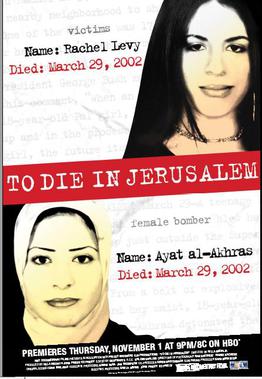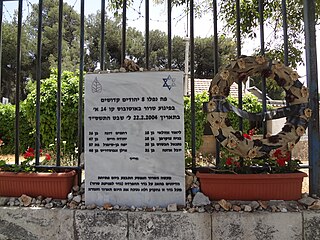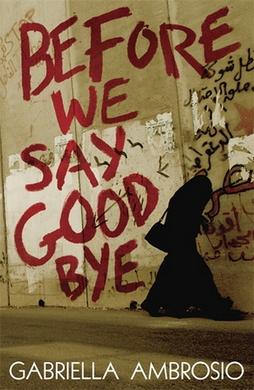Note: This compilation includes only those attacks that resulted in casualties. Attacks which did not kill or wound are not included.
This page is a partial listing of incidents of violence in the Israeli-Palestinian conflict in 2003.

The Passover massacre was a suicide bombing carried out by Hamas at the Park Hotel in Netanya, Israel on 27 March 2002, during a Passover seder. 30 civilians were killed in the attack and 140 were injured. It was the deadliest attack against Israeli civilians during the Second Intifada.
As part of the Arab–Israeli conflict, especially during the Second Intifada from 2000 to 2005, Palestinian militant groups used children for suicide bombings. Minors were recruited to attack Israeli targets, both military and civilian. This deliberate involvement of children in armed conflict was condemned by international human rights organizations.
Ayat al-Akhras was the third and youngest Palestinian female suicide bomber who, at age 18, killed herself and two Israeli civilians on March 29, 2002, by detonating explosives belted to her body. The killings gained widespread international attention due to Ayat's age and gender and the fact that one of the victims was also a teenage girl.

A suicide bombing on an Egged bus was carried out by Hamas in Jerusalem on June 18, 2002, killing 19 people and wounding over 74. 17 of the dead were residents of Gilo.

Wafa Idris, a Palestinian Red Crescent volunteer, was the first female suicide bomber in the Israeli–Palestinian conflict. She killed herself while committing the Jaffa Street bombing. At the time of her suicide, Idris was a 28-year-old, divorcee, and lived in the Am'ari Refugee Camp in Ramallah.

On 1 June 2001, a Hamas-affiliated terrorist blew himself up outside the Dolphinarium discotheque on the beachfront in Tel Aviv, Israel, killing 21 Israelis, 16 of whom were teenagers. The majority of the victims were Israeli teenage girls whose families had recently immigrated from the former Soviet Union.

Kiryat HaYovel is a neighborhood in southwestern Jerusalem on Mount Herzl. It was built in the early 1950s to house new immigrants. Today, Kiryat HaYovel has a population of 25,000 residents.

To Die in Jerusalem is a 2007 HBO documentary film about the effects of a March 29, 2002, Jerusalem suicide bombing on the families of the 17-year-old Israeli victim Rachel Levy and the 18-year-old Palestinian female suicide bomber, Ayat al-Akhras. Al-Akhras blew herself up at the entrance of Kiryat HaYovel's main supermarket, killing two people and injuring 28.

Israeli casualties of war, in addition to those of Israel's nine major wars, include 9,745 soldiers and security forces personnel killed in "miscellaneous engagements and terrorist attacks", which includes security forces members killed during military operations, by fighting crime, natural disasters, diseases, traffic or labor accidents and disabled veterans whose disabilities contributed to their deaths. Between 1948 and 1997, 20,093 Israeli soldiers were killed in combat, 75,000 Israelis were wounded, and nearly 100,000 Israelis were considered disabled army veterans. On the other hand, in 2010 Yom Hazikaron, Israel honored the memory of 22,684 Israeli soldiers and pre-Israeli Palestinian Jews killed since 1860 in the line of duty for the independence, preservation and protection of the nation, and 3,971 civilian terror victims. The memorial roll, in addition to IDF members deceased, also include fallen members of the Shin Bet security service, the Mossad intelligence service, the Israel Police, the Border Police, the Israel Prisons Service, other Israeli security forces, the pre-state Jewish underground, and the Jewish Brigade and the Jewish Legion.
Events in the year 2003 in Israel.
Events in the year 2002 in Israel.
Events in the year 2001 in Israel.
The Café Apropo bombing was a Palestinian suicide bombing which occurred on 21 March 1997 in a coffee shop in Tel Aviv. Three women were killed in the attack and 48 were injured.
Events in the year 2001 in the Palestinian territories.
On 25 January 2002, a Palestinian suicide bomber injured at least 24 civilians in Tel Aviv, Israel. Afterwards, the Islamist Palestinian militant organization Islamic Jihad claimed responsibility.

The Liberty Bell Park bus bombing was a suicide bombing which occurred on February 22, 2004 in Egged bus No. 14A in Jerusalem. Eight passengers were killed in the attack and over 60 people were injured, many of them were children on their way to school. The Al-Aqsa Martyrs' Brigades claimed responsibility for the attack.

Before We Say Goodbye, first published as Prima di Lasciarsi, is a 2004 novel by Gabriella Ambrosio. The work is based on the 2002 Kiryat HaYovel supermarket bombing and narrates the final hours in the lives of the suicide bomber and her victims. It was first published in Italy in 2004 through Nutrimenti, and was later published in English on 2 August 2010 through Walker Books. The novel has been published in multiple languages, including Arabic and Hebrew, and has been endorsed in some countries by Amnesty International.













